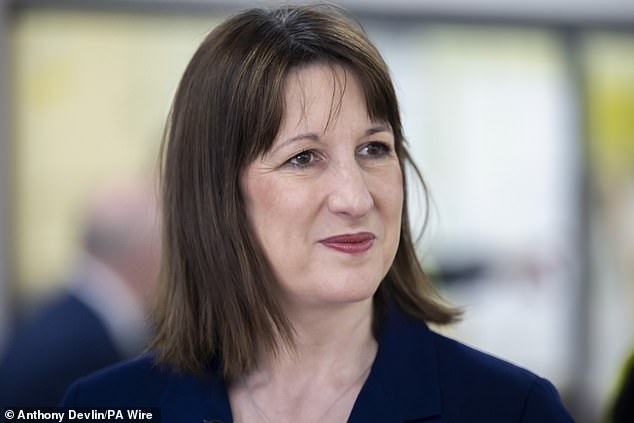Company profits are set to plunge to their lowest level since the financial crisis when measured as a share of national income, the UK’s independent budget watchdog has warned.
In its latest update on the state of the public finances, the Office for Budget Responsibility (OBR) blames the alarming drop on recent inflation-busting pay rises, which have eroded companies’ margins.
And businesses face a triple whammy of extra costs next week, which will further dent their bottom line.
These include a £25billion increase in employers’ National Insurance Contributions, a rise in the national minimum wage and lower business rates relief.
Growth has flatlined since Rachel Reeves announced the controversial measures in her Budget last year, crushing business confidence.
In a huge blow to the Chancellor, the OBR halved this year’s growth forecast to just 1 per cent as the threat of a global trade war intensified and government borrowing costs edged higher.

Loss of confidence: In a huge blow to the Chancellor, the OBR halved this year’s growth forecast to just 1 per cent
The watchdog also cut its estimate of how much money would be raised from corporation tax, which is charged at 25 per cent of most company’s profits. It raises about £90billion for the cash-strapped Treasury.
The tax will net £5.5billion less this year than the OBR forecast in October, following Reeves’s disastrous autumn Budget.
‘This is in part due to persistent earnings growth squeezing profits, and higher than anticipated inflation and interest costs for small companies,’ the OBR said.
Corporation tax receipts are forecast to be £4.6billion lower than expected in each remaining year of the decade, it added. This means company profits as a share of gross domestic product (GDP) are expected to fall from 15.1 per cent in 2024 to 14.3 per cent this year – ‘a level last seen in 2010 after the global financial crisis’, according to the OBR.
‘Wage settlement expectations have continued to outpace productivity growth and inflation,’ the watchdog added.
The rise in employers’ National Insurance Contributions will also initially hit profits, the OBR said.
Growth in wages accelerated to 5.9 per cent in the last three months of 2024 – more than double the current inflation rate, meaning workers are better off in real terms.
The OBR is concerned that these pay rises are hitting company profits because they are not matched by improvements in productivity, as measured by output per hour worked.

The official forecaster has consistently overestimated how much more efficiently workers will produce goods and services, with one economist saying its outlook was so rosy it was ‘starting to look insane’.
The OBR’s medium-term forecast is for productivity to grow by 1.25 per cent, which is far higher than the Bank of England’s 0.7 per cent estimate.
Its optimistic view allowed Reeves to meet her fiscal rules – but only just. She balanced the books with just £10billion to spare. But that ‘tiny’ headroom would be wiped out in the event of an all-out trade war with the US, said OBR chairman Richard Hughes.
Ministers are locked in what Reeves called ‘intense negotiations’ with the US over a trade deal to avert 25 per cent tariffs on British cars due to come into force as early as Wednesday.
The rise in employers’ payroll taxes is expected to fuel inflation as firms pass on the increased costs to consumers in the form of higher prices.
But the OBR expects companies will also absorb some of the hit themselves in lower profits.
Overall tax as a share of GDP is set to rise from 35.3 per cent this year to what the OBR calls ‘a historic high’ of 37.7 per cent in 2027-28.
Reeves has promised business leaders she was ‘not coming back with more borrowing or more taxes’. But experts say the parlous state of the public finances leaves her few choices.
She has ruled out raising taxes on ‘working people’, but economists think she may still go for extending the freeze on income tax thresholds.
These normally rise with inflation, but were frozen by the previous Conservative government in 2022, dragging millions of workers into higher tax bands as inflation soared, swelling the Treasury’s coffers.
The freeze is scheduled to remain in place until 2028, but Reeves could ease pressure on the public finances by lengthening it until the end of the decade, netting another £10billion a year.
Anna Leach, senior economist at the Institute of Directors, said: ‘It makes a lot of money’ for the Chancellor, adding: ‘It’s a really obvious one to do.’
DIY INVESTING PLATFORMS

AJ Bell

AJ Bell
Easy investing and ready-made portfolios

Hargreaves Lansdown

Hargreaves Lansdown
Free fund dealing and investment ideas

interactive investor

interactive investor
Flat-fee investing from £4.99 per month

Saxo

Saxo
Get £200 back in trading fees
Trading 212
Trading 212
Free dealing and no account fee
Affiliate links: If you take out a product This is Money may earn a commission. These deals are chosen by our editorial team, as we think they are worth highlighting. This does not affect our editorial independence.
This article was originally published by a www.dailymail.co.uk . Read the Original article here. .


